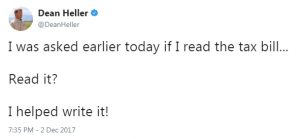Three Things: The Reanimation of Nixon Among Them
Busy, busy week. Load up on the caffeine or stimulant of choice and let’s get cracking.
~ 3 ~
At 9:00 pm EST Saturday evening I posted:
Any time now I expect someone in the administration will not only say openly that Trump authorized the transition team to discuss dropping the sanctions, but that it isn’t illegal when the president does it.
This morning about 6:00 am EST in Axios:
John Dowd, President Trump’s outside lawyer, outlined to me a new and highly controversial defense/theory in the Russia probe: A president cannot be guilty of obstruction of justice.
The “President cannot obstruct justice because he is the chief law enforcement officer under [the Constitution’s Article II] and has every right to express his view of any case,” Dowd claims. (emphasis mine)
It’s like they dug up Nixon and reanimated him with a chatbot. No wonder the White House is infested with mice and insects.
~ 2 ~
The Tax Scam Bill isn’t yet legislation; we still have at least a couple chances to kill it. It will be up for a vote in the House today, under a Motion to Go to Conference. Call your representatives well before 6:00 p.m. and ask them to vote NO on going to conference. This bill should simply not proceed any further.
Did you know those GOP jackasses in the Senate actually added a tax on retail gift cards? If your employer gives your a grocery store gift card to buy a holiday ham, you could be taxed on it. If you tip your child’s caregiver with a retail gift card they could be taxed on it. What is wrong with these Dickensian jerks?
I’m not the only one who thought of Scrooge when Old Man Orrin Hatch complained about poor children who relied on CHIP health care, saying ““I have a rough time wanting to spend billions and billions and trillions of dollars to help people who won’t help themselves – won’t lift a finger – and expect the federal government to do everything.”
By the way, it was Hatch who added the retail gift card tax. Leave no meal to a poor child untaxed.
Need a little help with that phone call to your rep? See @Celeste_pewter — she’s got you covered.
~ 1 ~
Folks in Nevada need to take a cluestick to Senator Dean Heller after his execrable public townhall this weekend. His security goon squad first threatened a Stage 4 cancer patient, then threw her out along with an elderly woman with a broken arm. At least 10 attendees were ejected.
There’s no escaping how bad the optics were; Heller wants this Tax Scam Bill for his oligarchic sponsors so badly he’ll step on the sick, injured, and elderly to get it. And then Heller doubled down on his monstrousness when asked if he’d read the Tax Scam Bill, tweeting, “Read it? I helped write it!”
It’s on you, Heller. This is your legacy. You said it, you wrote it.
~ 0 ~
Our celebration of emptywheel’s 10th anniversary continues. Watch for a post by Jim White midday today; Marcy is working on a super-sized post on all things surveillance. Stay tuned!
And if you can pitch in some rodent chow to keep the site’s squirrels on their treadmill, we’d appreciate it greatly.
This is an open thread — your off-topic comments are welcomed in this thread. Let’s kick some ass and take names this Monday morning.


